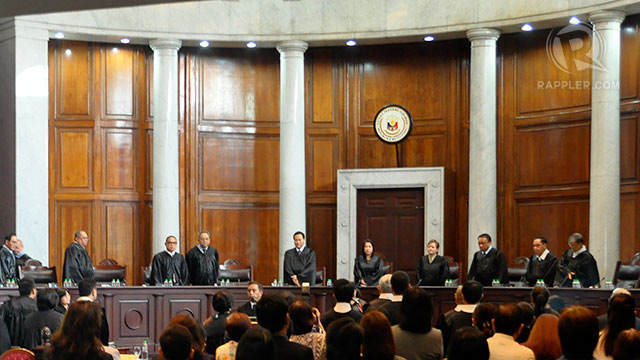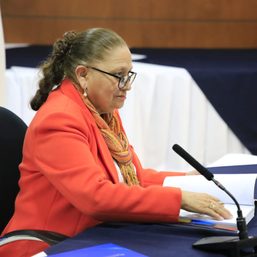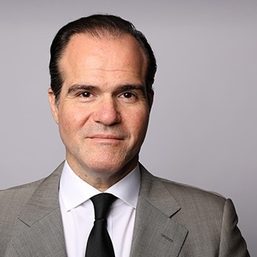SUMMARY
This is AI generated summarization, which may have errors. For context, always refer to the full article.

MANILA, Philippines – “Congress was really participating actively in the programming and realignment. It’s as if they’re part of the planning team of DPWH (Department of Public Works and Highways).”
Chief Justice Maria Lourdes Sereno questioned the role of legislators in the release and realignment of the pork barrel, saying “you can’t make changes without the consent of the proponents.”
During the resumption of Supreme Court oral arguments on the constitutionality of the pork barrel on Thursday, October 10, Sereno told Solicitor General Francis Jardeleza that she saw problems in the participation of lawmakers in the execution of projects. Jardeleza represents the executive and legislative branches, respondents in the case.
The Court is handling 3 petitions questioning the legality of the Priority Development Assistance Fund (PDAF), with petitioners arguing that it violates the principles of separation of powers, checks and balances, and accountability enshrined in the Constitution.
Sereno said, “What is of greater concern to me is to imagine Congress embroiled in a debate trying to draw constitutional lines blurred in 22 years of practice where there has been participation in the budget execution.”
In again tracing the history of the PDAF in budget laws since 1991, Sereno asked why the concurrence of members of Congress was needed to realign and release of funds. (READ: ‘Pork’ through the years: It got complicated)
Sereno pointed out that in 1994, even the release of the internal revenue allotment (IRA) required that the congressman be notified even if he is not a local official. She also cited Republic Act 8150, which required that public works projects be coordinated with oversight committees of the Senate and the House.
In most cases, representatives from the Department of Budget and Management (DBM), Senate, and the House of Representatives answered that they had “no idea” why the law made these requirements.
The DBM was represented by lawyer Rowena Candice Ruiz while lawyer Valentina Cruz spoke for the Senate.
Petitioners Greco Belgica, Samson Alcantara and Pedrito Nepomuceno questioned the constitutionality of the so-called congressional and presidential pork barrel on the heels of the pork barrel scam. In the scam, lawmakers allegedly siphoned off their PDAF to fake non-governmental organizations in exchange for kickbacks as big as 50% of the ghost project.
The Supreme Court said it will decide on the case by November, after Congress appealed for a swift resolution before the passage of the 2014 budget.
Lawmakers ‘surprised’ at own rules
Sereno said the answers “reinforced her thought” that neither the executive nor legislative branch “faced the question of constitutional compatibility of how they were engineering the budget process.”
“The word you are using is ‘surprise,’ surprise that all these things are surfacing,” Sereno told the representatives.
“In a sense, we should be thankful that [all the past practices] are in the PDAF special provisions [in 2013] but it only highlights to us that there are many constitutional issues we have to confront,” the Chief Justice said.
Sereno then asked Jardeleza, “Isn’t it wiser for us to come up with a full decision so we can clarify special provision by special provision the constitutional problems we will face if such reappear in one part of the budget, a supplemental budget, or another statute?”
Jardeleza though maintained that the executive and legislative branches should be allowed to complete reforms in the pork barrel system. He said Congress already removed the PDAF from the 2014 budget and transferred the funds to agencies using line-item budgeting.
“The view of the Office of the Solicitor General is caution because judicial review is awesome power…. Our thought is if there is any chance for the political branches to make those guidelines informed with all concerns raised in public and in this Court, there will be leeway.”
Legislators’ role just recommendatory
Jardeleza disagreed with the position earlier expressed by Senior Associate Justice Antonio Carpio that the PDAF is “on its face” unconstitutional.
“The argument is made that [when] there is a request from the legislator, the powers [of the executive] are curtailed. Our answer is this is just a request…. As much as the legislator can identify [projects], it is the President who can issue an order for the release of the funds. We say again no constitutional line is breached.”
Jardeleza also maintained that the Supreme Court’s previous rulings upholding the constitutionality of the PDAF still apply. These are Philippine Constitution Association (Philconsa) v Enriquez in 1994, Andres Sarmiento et al v the Treasurer of the Philippines et al in 2001, and Lawyers Against Monopoly and Poverty (LAMP) v Secretary of Budget and Management in 2012.
Carpio though said that the special provisions added to the budget law through the years made the past rulings inapplicable. He said the 2013 GAA already required the concurrence of lawmakers and congressional committees in realigning and releasing funds.
“It was very clear that the Philconsa PDAF provision was just recommendatory. It did not contain special provisions 4 and 5. Any Tom, Dick and Harry can recommend to the president but legislators inserted 4 and 5 which made recommendation mandatory,” Carpio said.
Carpio pointed out that the provision was phrased to say “shall be favorably endorsed by House committee,” indicating that it was a mandatory requirement.
Jardeleza argued though that the role of the legislator was just “directory” or recommendatory.
“Congress can put all those provisions as a matter of restraint, constraint for good housekeeping,” Jardeleza said. This is request, has to be favorably endorsed. This is a matter of documentation.”
Carpio ordered him to expound his point in a memorandum.
‘President can’t abolish PDAF’
Carpio also questioned the plea of the government to lift the temporary restraining order (TRO) on the PDAF for educational and medical assistance. Jardeleza said half a million scholars and indigent patients are affected by the TRO.
“They were not a party to any misuse or corruption. We plead on their behalf. Please give them the benefit of the doubt,” said the solicitor general.
Carpio though said, “Why are you asking us to lift the TRO when you already announced you abolished PDAF? It’s irreconcilable.”
President Benigno Aquino III and the leaders of Congress have announced that the PDAF in its current form has been abolished. The House approved on second reading the 2014 budget where P25.4 billion was transfered to departments but lawmakers can still recommend projects that will be funded. Critics have said this was still “pork by another name.”
Carpio asked if the President has the power to abolish the PDAF.
Jardeleza said, “Our position is the President has a general power to stop releases.”
Carpio said, “That’s not my question. You’re saying the President has power to impound PDAF funds. The President is invoking the power to impound?”
Jardeleza said, “In a general way, yes.”
“If there are anomalies, the President has the power to stop and investigate, the power to suspend further expenditures and payment, but it is just to suspend,” Carpio said.
Carpio said there are only two ways the PDAF can be abolished: for Congress to pass a law repealing it, and for the Court to declare it unconstitutional.
The justice also said that the PDAF should have been listed as a line item in the budget instead of a lump sum to allow the President to exercise his line item veto power.
Carpio said, “What should have been done for putting scholars, there’s an amount for each item in the budget so he can strike down wasteful spending. That’s the reason there has to be itemization. That’s why there is a corresponding duty on the part of Congress to specify by line so the President can exercise line item veto.”
Jardeleza again said the Philconsa ruling supported the government position.
Carpio replied: “In Philconsa, there were no special provisions. If you rely on Philconsa, you’re way off the mark counsel.”
Carpio also questioned Jardeleza’s statement that the Court should allow the political branch to correct the problem first.
“It is our duty to faithfully apply the Constitution. You are asking us to defer our solemn duty to apply the Constitution. I think you ask too much of this Court,” Carpio told Jardeleza. – Rappler.com
Add a comment
How does this make you feel?


![[WATCH] Try This: Empanada Salteña from Argentina](https://www.rappler.com/tachyon/2023/04/try-this-empanada-saltena-argentina.jpg?resize=257%2C257&crop=765px%2C0px%2C1037px%2C1037px)


There are no comments yet. Add your comment to start the conversation.